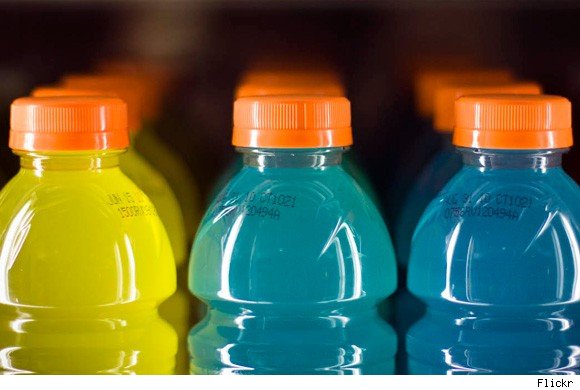 Energy and sports drinks can damage tooth enamel, boosting the risk of cavities, according to an American Journal of Dentistry study.
The big misconception is that energy drinks and sports drinks are healthier than soda for oral health, but studies disproves that, because they erode or thin out the enamel of the teeth, leaving them more susceptible to decay and sensitivity.
Energy and sports drinks can damage tooth enamel, boosting the risk of cavities, according to an American Journal of Dentistry study.
The big misconception is that energy drinks and sports drinks are healthier than soda for oral health, but studies disproves that, because they erode or thin out the enamel of the teeth, leaving them more susceptible to decay and sensitivity.
The drinks are especially popular among teens and young adults. Up to half of U.S. teens and young adults drink energy drinks, and more than half have at least one sports drink a day, according to the researchers.
Researcher Poonam Jain, BDS, MPH, associate professor and director of community dentistry at the Southern Illinois University School of Dental Medicine and her team tested 13 sports drinks and nine energy drinks for acidity. They tested six drinks for their effects on tooth enamel and found both types caused damage. Energy drinks, however, were twice as bad. Remember:damaged tooth enamel cannot be fixed.Jain's team immersed enamel samples from extracted human teeth into three sports drinks and three energy drinks.
They tested the acidity levels of all 22 drinks. They found the levels of acidity in the drinks vary between brands and between flavors of the same brands.
Sports drinks, energy drinks, and teeth: study details
Up to half of U.S. teens and young adults drink energy drinks, and more than half have at least one sports drink a day, according to the researchers. Other study results included:Gatorade Blue had the highest acidity among sports drinks. Next was Hydr8.
Among the energy drinks with the highest acidity:
- Red Bull Sugar=free
- Monster Assault
- 5-hour Energy
- Von Dutch
- Rockstar
MDX had the lowest acidity of the energy drinks.
The sports drinks tested were:
- Gatorade Rain
- Powerade Option
- Propel Grape
The energy drinks tested were:
- Monster Assault
- Red Bull
- 5-hour Energy
The enamel samples were immersed in the drinks for 15 minutes. The researchers transferred the enamel to artificial saliva for two hours.
This cycle was repeated four times a day for five days. The beverages were replaced with fresh ones every day.
The cycle was meant to simulate real life, Jain says, as some teens and young adults drink the beverages every few hours.
Enamel loss was evident after five days of exposure, Jain says.
The average enamel lost with sports drinks was about 1.5%, while the average loss with energy drinks was more than 3%. Jain says she cannot pinpoint what percent of enamel loss would cause problems.
Advice for sports drink lovers
Even one drink a day is potentially harmful, Jain says.
"If the consumer is absolutely unable to give them up, the best advice is to minimize [their use] and rinse with water afterwards," she says.
"Dilute them," she says. Do not brush immediately after drinking them, she says, as this could spread around the acid. "The mouth takes about 30 minutes to bring the pH back to normal. Wait an hour after drinking the sports or energy drink, to be safe, then brush."
It is very important to read labels on any drink you choose to prevent the cavities and gum disease that these drinks can cause. Also, be aware that the cream and sugar you put in your coffee in the morning has the same effect as other high sugar drinks.
The best drink of choice for the health of your teeth and gums is plain water. We're realistic though, and understand this can be difficult for anyone to regularly practice. If you’re going to have a soda or sweetened drink, be careful to drink them all in one sitting rather than sipping for a long time, and try to have a drink of water when you’re finished.
